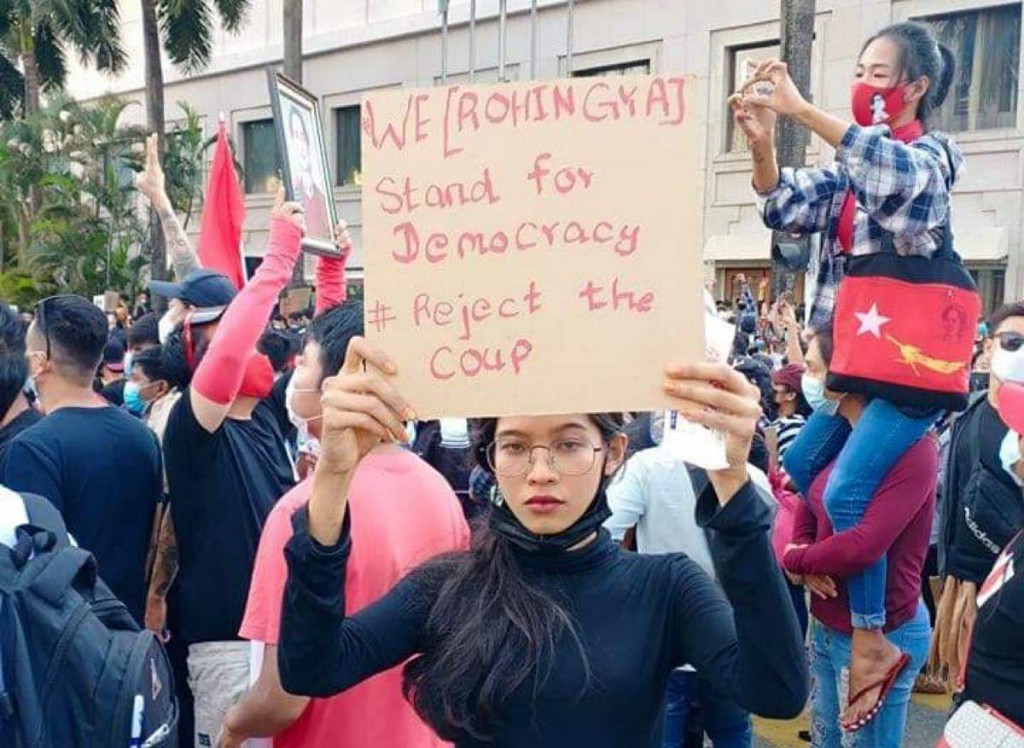Since the military coup that led to the arrests of President Win Mying, Aung Sun Suu Kyi and several pro-democracy activists of the National League for Democracy (NLD), tensions between civilians and the military have escalated into violent protests against the military rule and instances of human rights violations by the army. Eventually, this occurrence leaves a narrow window for civil-military consensus, marking a setback for the democratic forces in Myanmar. Nevertheless, there are few lessons that can be drawn from the 2018 Sudanese revolution, when it comes to national and international responses to the current civil-military tensions. Despite the difference in context, the Sudanese case depicts the importance of women in reassessing civil-military relations. Understanding this becomes crucial in the peacebuilding process and promoting effective political consensus.
Women’s Role in Democratic Protests
In December 2018, popular support for a military revolution in Sudan sharply increased amidst the long-term dictatorship under Omar al-Bashir. The army’s revolutionary intervention was initially in response to protests against economic crisis, oppression, and dictatorial rule under the 30-year leadership of al-Bashir. Among the driving forces behind the revolution, Sudanese women stood at the frontlines of street protests and online activism. The revolution was a crucial process to defeat patriarchal laws that restricted women’s social and political rights and legitimized the arrest and sexual assaults of pro-democratic female activists. Women’s role in society is usually limited to housewives, unequal pay, and subservient position, making them easy targets for abuse. Eventually, the relentless efforts of Sudanese women were fueled by their desire to end not only marital abuses but also social persecutions in general. However, the ousting of al-Bashir did not mark an end to the democratic struggle as military leaders took an active stand in political management. While dozens of women were arrested amidst opposition and public expression, many Sudanese women – particularly activists, journalists, and artists – emerged as a collective influential voice for democracy and a threat to the military regime.
In Myanmar, the arrests of State Counsellor Suu Kyi and members of the NLD are setbacks to the years of struggle for the cause of women’s inclusion in politics, as well as a symbol of persistent patriarchal rule. As the stand of the military is clearly demonstrated, around 60 percent of anti-coup protesters are women who perceive the military control as a sign of women’s rights crisis.
Women’s participation in the democratic struggle in Sudan implies that they are the most vulnerable under military rule. Similarly, As the majority of anti-coup protests in Myanmar consist of women, it demonstrates that similar threats are imminent. It is for this reason that Daisy, a 29-year-old female school teacher and protester in Myanmar stated, “as women, we are the most at risk under the military but however large or small, our place is in the revolution”.
Women on Moral Duty of the Military and Growing Civilian Radicalization
On May 3, 2021, the Assistance Association for Political Prisoners reported 766 civilians killed, 4674 arrested, and 3614 detained in Myanmar. A large number of Myanmar citizens organized into dozens of armed groups in order to support the anti-coup protests that already saw numerous casualties and displacements among them. Referring to article 417 of the Burmese constitution, the military justifies its use of force to seize executive, legislative and judicial authorities in the event of emerging threats to national sovereignty, which, in this context termed anti-coup protesters and the deposed government as emerging threats.
Equally, a similar scenario has encouraged the Sudanese army to step up and manage the political transition, while attempting to deter post-revolution uprisings and all forms of anti-military campaigns in Sudan. As a result, protests became even more violent and more organized amidst persistent human rights and constitutional violations by the Sudanese army until this day. As military leaders promised to deliver unity and peaceful transition, their continuous disrespect toward national laws and human rights could remain a long-term fuel for civilian uprisings.
The ongoing Civilian-Military consternation in Sudan clearly warns of a long-lasting democratic struggle that awaits Myanmar, if the military’s actions continue to downplay the importance of women in politics, as well as civilians’ democratic will. The “three-fingered salute” is a reminder that Myanmar’s power remains in the hands of the people, including women. As such, the military moral duty to serve the people – mothers, wives, children and men – they swore to protect is not only a social contract but also a reminder of the fact that ethical judgement and dialogue is possible. A month ago, the image of a catholic nun kneeling in prayer for peace and democracy between protesters and soldiers has moved international communities and Myanmar’s civilians and soldiers alike. Sister Ann Nu Thwang’s gesture became a powerful symbol of hope that women can promote common sense and dialogue between civilians and the military. Similarly, building peace between civilians and military remains a struggle for Amira Kabous and Samahir Elmubakar – Sudanese women activists who are pushing for civilian-led governance, democracy and women’s rights after the revolution in Sudan. However, it is undeniable that women in Sudan and Myanmar play a central role in dialogue and reconciliation in civil-military relations, and encouraging ethical revisions among military ranks.

